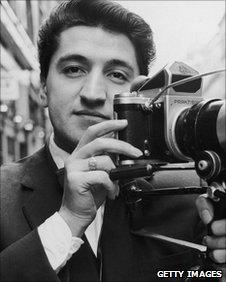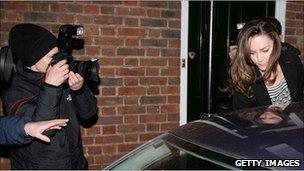Royal wedding: Royals' uneasy peace with the paparazzi
- Published
- comments

Early paparazzo Ray Bellisario, who got into trouble with the royals
Kate Middleton's family have complained about harassment by photographers. Yet the royals and those behind the camera lenses are locked in a relationship that is often delicately balanced.
"What are you doing here?" Prince Philip demanded. "I know the way you operate. I saw you myself climbing in the trees, you're always in trees and bushes."
The setting was Scotland in the 60s and the recipient of the princely tongue-lashing was a photographer, Ray Bellisario, whose autobiography is aptly titled, To Tread on Royal Toes. Around the same time, the Queen's husband accused one of Bellisario's colleagues of poking his camera's long lens into Princess Anne's inner ear.
Royals and photographers are unnatural bedfellows locked in an eternal embrace. A nightmare for the Windsors would be if they were completely ignored; for photographers, particularly freelance ones, a snap of a prince kissing a girlfriend on a secluded beach, helps pay the mortgage.
The royals' answer to this troublesome symbiotic relationship is to impose control. Photographers, camera crews and reporters are kept at a respectful distance as the Monarch and her extended family go about their official business. Their private activities are strictly off-limits.
The relationship tends to fray once a potential new member appears. Kate Middleton, according to those who represent her, had a challenging introduction to Prince William's world. Six years ago her lawyers asked newspaper editors to leave her alone - she was being hounded, they said, and followed almost daily by photographers.

Face on - photographers crowd in on Kate Middleton as she marks her 25th birthday
She was snapped on a bus; on a shopping trip; and going to work with a coffee in her hand - that image prompted her first and so far only official complaint to the Press Complaints Commission. The paper which published the photo, the Mirror, swiftly apologised saying, "We got it wrong and we sincerely regret that".
'Necessary evil'
The low point for the future queen came on her 25th birthday when she was surrounded by 20 photographers and five television crews as she walked the short distance from her front door to her car.
Prince William has adopted a robust, rather muscular approach. The right to royal privacy is something he is determined to establish. He believes he has the law on his side. When Kate and her family were photographed playing tennis one Christmas, they went after the picture agency and received damages for breach of privacy.
At best, Prince William views the media as a necessary evil. In his darker moments - captured in the recent books by Alastair Campbell and Tony Blair - the future king holds parts of the fourth estate in some way responsible for his mother's untimely death.
Gross negligence
Diana, Princess of Wales had a complex relationship with the press. At times, she used them - to promote a cause or to get one over on her husband during the "War of the Waleses"; on other occasions, she talked of living abroad to escape the unremitting attention of the paparazzi.
The princess died in Paris with some of them pursuing her car. An inquest jury ruled she and her companion, Dodi Fayed, were unlawfully killed - and their drunk driver and the paparazzi had been grossly negligent.
Fourteen years on, the code of practice, external for newspapers explicitly states that, "journalists must not engage in intimidation, harassment or persistent pursuit."
Despite this, there have been occasional echoes of the past. William's "stomach was turned", we were told, when he was followed through London by photographers in cars and motorbikes after he'd left a nightclub. The pursuit happened four years ago at the start of the Diana Inquest.
And last week Kate Middleton's mother and sister say they were subjected to the same treatment as they shopped in the capital. The Middleton family contacted the Press Complaints Commission to complain about harassment.
Overall though, an uneasy peace seems to exist between the couple who represent the monarchy's future and those who want to capture them at work and at play.
Photographers have been warned again after a complaint from the Middleton family
So far, William and Kate have the upper hand. They don't fall out of nightclubs; they have access to large, private estates; and they're surrounded by friends who - at least this side of a wedding dinner dance at Buckingham Palace - wouldn't reveal the couple's whereabouts even if they were tortured on a medieval rack.
There is though a weakness in the armoury of the prince and princess-to-be. They have limited, and in some cases, no control over foreign publications. Women's magazines from Timbuktu to Tirana crave images of Kate.
"The demand is massive", says Joe Sene, who works at the picture agency, Splash UK. "The financial reward for pictures is huge. Think of a number. Add a zero and double it at the moment".
Dennis Gill is one of those seeking such financial rewards. His natural habitat is the nightclubs of London, after dark. As the photographer himself puts it, "If I get Kate and William tonight, then I've got a seller around the world. It's going to sell big time."